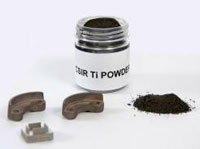
To date, the CSIR is the only organisation in the world that has been able to do this, using a novel process developed by South African researchers.
Dr Dawie van Vuuren, leader of the project at the CSIR's Unit for Material Science and Manufacturing, says this is an important achievement for South Africa, as it creates new opportunities for titanium beneficiation in the country.
Following Australia, South Africa has the second largest titanium-bearing reserves in the world. Processing and beneficiation of locally mined minerals, such as titanium ore, can be a lucrative revenue stream for the country.
South Africa has the raw materials and a market for the metal, all that's needed now is a strong local titanium industry, and a processing method.
Manufacturing titanium powder might just be the solution.
"The powder can be used directly to manufacture components, instead of melting and casting the metal," Van Vuuren explains. "The process offers major cost and energy savings and this is why we want to make the powder."
A thriving beneficiation industry can also create more sustainable jobs and be an incentive to start and sustain new industries.
The government's new growth path, introduced in 2010, identified the need to create more inclusive economic growth by encouraging the development of more labour intensive activities. Mineral beneficiation was flagged as one such priority area to create much needed jobs.
"We hope to create a new industry in South Africa," Van Vuuren says. "The national benefits that would arise from a world-scale, low-cost titanium metal plant are considerable."
South Africa has always relied on its strong resource economy and reputation as one of the world's leading mining and mineral-processing countries. Yet, according to a Department of Mineral Resources document, a considerable amount of the country's mineral resources are exported as raw ores, or only partially processed.
According to Moneyweb the titanium industry could generate revenue of up to R5-billion (US$602-million) per annum, and give South Africa up to 10% of international market share by 2020.
"Numerous studies by government and industry have been done over many years to investigate how we can add value, and this is one way to do it," Van Vuuren explains.
An important aspect of the project is to ensure that the production of titanium powder is economically viable.
For South Africa to be competitive in the world market, it must produce the metal more cheaply than other manufacturers.
"Being able to produce titanium powder at a much lower cost than present imports will make this light metal an economically viable option, from which many industries can be created and sustained," says Van Vuuren.
South Africa exports most of its titanium in the form of titanium dioxide or slag, widely used as a white pigment in paint production.
There is a big market for slag worldwide - annually five million tons of pigment is produced for the paint industry, in comparison with only 200 000 tons of metal.
The council's innovation comes at an opportune time for South Africa as the market for titanium metal is growing, particularly in sectors such as the commercial aircraft industry.
The aviation industry is using more titanium metal than aluminium as it is more durable and compatible with carbon fibre.
"Aluminium tends to corrode when it comes into contact with carbon fibre," Van Vuuren explains.
Titanium's corrosion-resistant properties make it ideal for the construction of offshore oil rigs and desalination plants. "The metal won't rust in sea water at all," he says.
The biomedical applications are numerous as titanium can be used to manufacture artificial joints. "It can be safely used for hip replacements and titanium plates are often used in back operations," he says. "Very few people are allergic to titanium."
The material's elasticity combined with its strength (it is twice as strong as steel) is useful in the sport industry to manufacture golf clubs and other sporting equipment parts.
The novel powder production process is the result of many years of research. Van Vuuren became interested in the metal ten years ago and after about 14 attempts to produce a powder, the team has found a method that works.
Van Vuuren explains why the CSIR's process works: "The rate of titanium tetrachloride reaction is slowed down by executing the process in a molten salt medium," he says. "That allows better control of the titanium particle morphology than other process variations."
Numerous organisations worldwide are also scaling up their own variations of processes to produce titanium metal powder.
"There is an international race to do this," he says.
But he says that there are many problems with some of the other processes, such as a very high heat reaction, the hazardous nature of the chemicals involved and the tendency of the titanium product to form lumps that block the reactor inlets and outlets.
The CSIR has started construction on their first on-site pilot plant, to test the new technology. The project is funded by the Department of Science and Technology.
"To do something in a test tube and on a large scale are two different things," Van Vuuren says. "The mini pilot plant will prove that the technology can be scaled up."
The pilot plant has a nominal design capacity of continuously producing 2 kg/hour of titanium powder.
"South Africa's entire titanium beneficiation strategy depends largely on the success of this pilot plant and its further commercialisation," says Van Vuuren.
MediaClubSouthAfrica.com is hosted by the International Marketing Council of South Africa (IMC), the custodian of Brand South Africa. The site is a free service for all media professionals - journalists, editors, writers, designers, picture editors and more - as well as for non-profit organisations and private individuals. Its specific focus is on South Africa and Africa.
Go to: http://www.mediaclubsouthafrica.com/